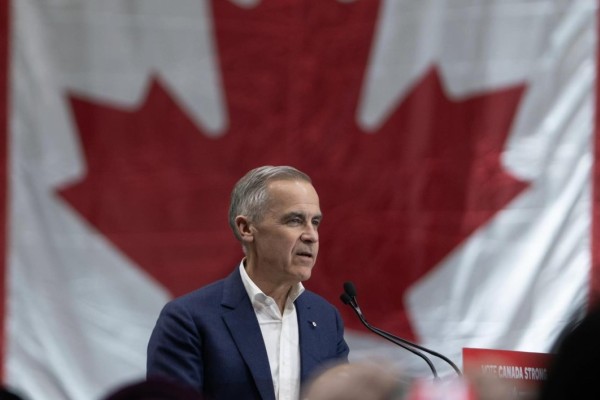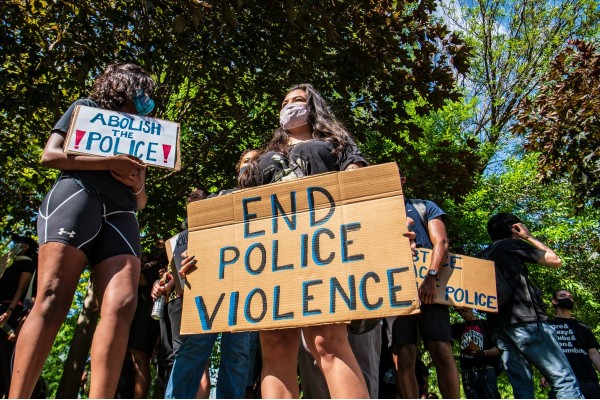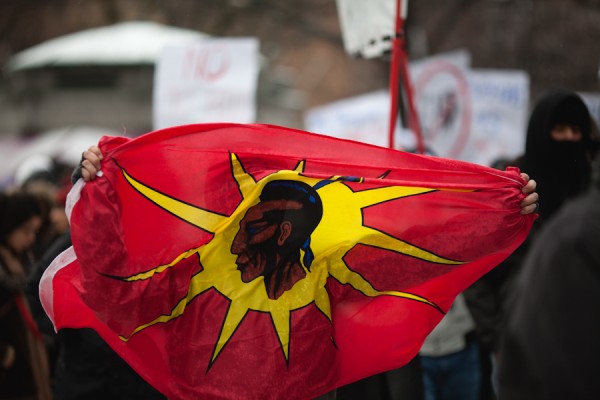Unhappy birthday

Illustration by Inori Roy
As Canada commemorates its sesquicentennial with a festival of propaganda, the gulf between this country’s reality and its image—prettily packaged at home and exported around the world—has perhaps never been wider. For evidence, we needn’t look further than the August cover of Rolling Stone exhibiting a photo of Justin Trudeau alongside the (anachronistically Cold War-tinged) question “Is he the free world’s best hope?”
With his rock-star good looks and his patina of progressivism, our young prime minister both embodies and enacts the disjunction between the perception of Canada as the good-natured peaceable kingdom and the Canada that perpetrates its own brand of crimes against humanity, with an unbroken record of violence and oppression of Indigenous peoples and the historically novel crime of aiding and abetting climate change, whose chief weapons are tar sands and pipelines, and whose victims are the poor of the Global South, future generations of humans, and innumerable other species. This criminal Canada fails to ensure access to clean drinking water for many Indigenous communities. It bills itself as a land of inclusion and opportunity, while old and new forms of racism fester. It poses as peaceful, while selling sophisticated military equipment to some of the world’s most retrograde regimes. It feigns fairness, while a few of its richest billionaires hoard as much wealth as the poorest 30 percent of the population combined. It fosters the perception of itself as a welcoming harbour for refugees, while erecting new and stringent barriers to entry just as the number of forcibly displaced people in the world reaches its highest level since the end of the Second World War.
Canadian Dimension has been reflecting critically on every aspect of the Canadian state and Canadian society for more than a third of the country’s history. In that time, there were moments of great hope for change, and some genuine steps forward: universal health care, for instance, now threatened by a tide of privatization; the Charter of Rights and Freedoms, the adoption of which was marred in particular by the Canadian state’s bulldozing and further alienation of Québec; advances in women’s equality and especially the de facto right to safe medical abortion on demand, limited in practice by cutbacks to services and jeopardized by repeated attempts to restrict access.
On the economic front, Canadians have never been masters in their own house and any hope for greater national control of our economy has lately been extinguished. When Canadian Dimension began publishing in the early 1960s, production, processing and transportation of raw materials and energy represented at least half of all goods exported. Over the decades, the country seemed at times to be extricating itself from dependency on the export of primary resources. Then, partly as a consequence of the Canada-US Free Trade Agreement and NAFTA, the ratio of resource-based exports soared to over two-thirds of the total. And little has changed, too, when it comes to foreign ownership and control of the economy. By 2015, foreign corporations accounted for fully 53 percent of Canadian manufacturing sales and 40 percent of oil and gas.
In the last 40 or so years, the policies of globalized neoliberal capitalism have dominated Canada’s economic and political evolution. Protest has been muted and complacency prevails—encouraged, here as everywhere, by the weapons of mass distraction and those who wield them. There are saving graces, of course: the Fight for $15 and efforts to win justice for migrant workers, for instance.
But today the most powerful voices of resistance in Canada come predominantly from nations within the Confederation who experience the Canadian state most directly, although in dramatically different ways, as the boot on their necks, the obstacle to their emancipation and flourishing: Indigenous Peoples, who are rising to claim sovereignty over their land, to protect that land and the ways of life rooted in it, and the forces within Québec society seeking to preserve the French language and culture in an independent country guided by a vision of social justice and sustainable environmental practices.
The late Mi’kmaq musician and activist Willie Dunn sang: “I pity the country/ I pity the state/ and the mind of the man/ that thrives on hate.” These are fitting words to recall as an antidote to the fiction and fanfare surrounding Canada’s 150th anniversary.
This article appeared in the Summer 2017 issue of Canadian Dimension (Canada 150).










